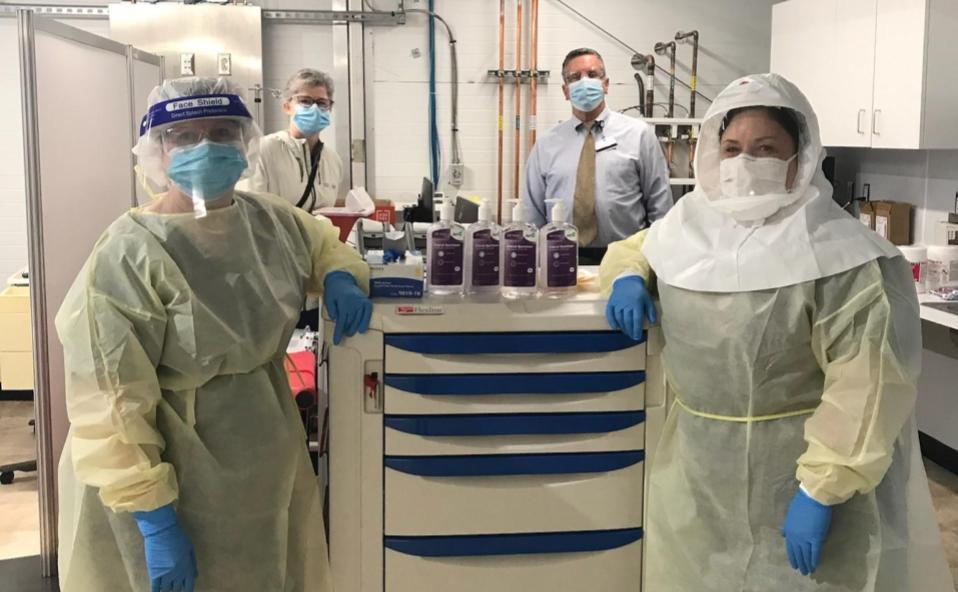 University of Maryland Shore Regional Health (UM SRH) is operating a new Infusion Center at Shore Medical Center at Easton to provide monoclonal antibody (mAb) treatment for certain individuals with COVID-19.
University of Maryland Shore Regional Health (UM SRH) is operating a new Infusion Center at Shore Medical Center at Easton to provide monoclonal antibody (mAb) treatment for certain individuals with COVID-19.
When administered within 10 days of the onset of symptoms, mAb treatment has been shown to reduce severe illness related to COVID-19 and an increased risk of patients’ hospitalization and death. The new COVID Infusion Center at UM Shore Medical Center at Easton provides Ab treatment to eligible COVID-19 patients over age 18 with mild-to-moderate symptoms who are deemed to be at high risk for progressing to severe COVID-19 and/or the need for hospitalization, and who are referred as possible candidates for infusion by a physician or other provider.
All referrals are reviewed and evaluated by Rosa Mateo, MD, infectious disease specialist.“We recommend referrals be made as soon as possible – and definitely within seven days of symptom onset –to allow time for review and scheduling before the patient reaches the 10-day ‘time out’ for receiving the treatment,” said Dr. William Huffner, MD, chief medical officer and senior vice president for Medical Affairs at UM SRH.
Photo: Shown in UM Shore Regional Health’s Monoclonal Antibody Infusion Center are (front) infusion nurses Mary Scott and Stacy Dion, and (back) Debbie Henson, infection prevention nurse, and Ron Lewis, director, Security/Emergency Management.
The Infusion Center is operating on Wednesday and Friday mornings by appointment only, and referred patients who meet the eligibility criteria are contacted and scheduled for the infusion treatment based on timeliness of treatment, the availability of medications, and other logistics.
In addition to being over 18 and within 10 days of symptom onset, patients likely to be eligible for monoclonal antibody infusion treatment include those who are high-risk, meaning 65 years of age or older and/or with certain chronic medical conditions. High-risk patients include those who have conditions such as obesity (body mass index greater than 35); chronic kidney disease; diabetes;or immunosuppressive disease (with or without treatment). Patients over age 55 with cardiovascular disease, hypertension or chronic obstructive pulmonary disease (COPD) or other chronic respiratory disease also are considered high risk.
Monoclonal antibody treatment is not authorized for use in patients who are hospitalized due to COVID-19, require oxygen therapy due to COVID-19, or for those who are on chronic oxygen therapy due to an underlying non-COVID-19 comorbidity and require an increase in baseline oxygen flow rate due to COVID-19.
UM SRH is authorized by the Maryland Department of Health to administer the EUA approved mAb treatment for COVID-19. These investigational treatments are authorized for use by the U.S. Food and Drug Administration (FDA) under Emergency Use Authorization (EUA) and currently include products made by Eli Lilly and Regeneron.
“While there is continued focus on access to the COVID-19 vaccines for people in our communities, it is critical that we keep utilizing all available tools in our COVID-19 response,” said Dr. Huffner. “Offering mAb treatment to patients is an important part of our plan to continue providing patients with the most appropriate and effective care, and also to alleviate additional strain on our hospitals.”
Healthcare providers and county health department officials throughout the five county region served by UM SRHhave been informed of the treatment availability, eligibility criteria and the referral process. Individuals with COVID-19 or their caregivers interested in seeking monoclonal antibody treatment are encouraged to contact their primary care or urgent care provider to request a referral.
The Infusion Center is located at 219 South Washington Street, in the advanced medical tent building behind the Emergency Department, Patient parking is available adjacent to the medical tent. Before arrival, patients will be given detailed instructions related to parking and a number to call upon arrival; someone will escort patients to the medical tent for the treatment. Only patients and Infusion Center staff are allowed inside the Center.



Write a Letter to the Editor on this Article
We encourage readers to offer their point of view on this article by submitting the following form. Editing is sometimes necessary and is done at the discretion of the editorial staff.